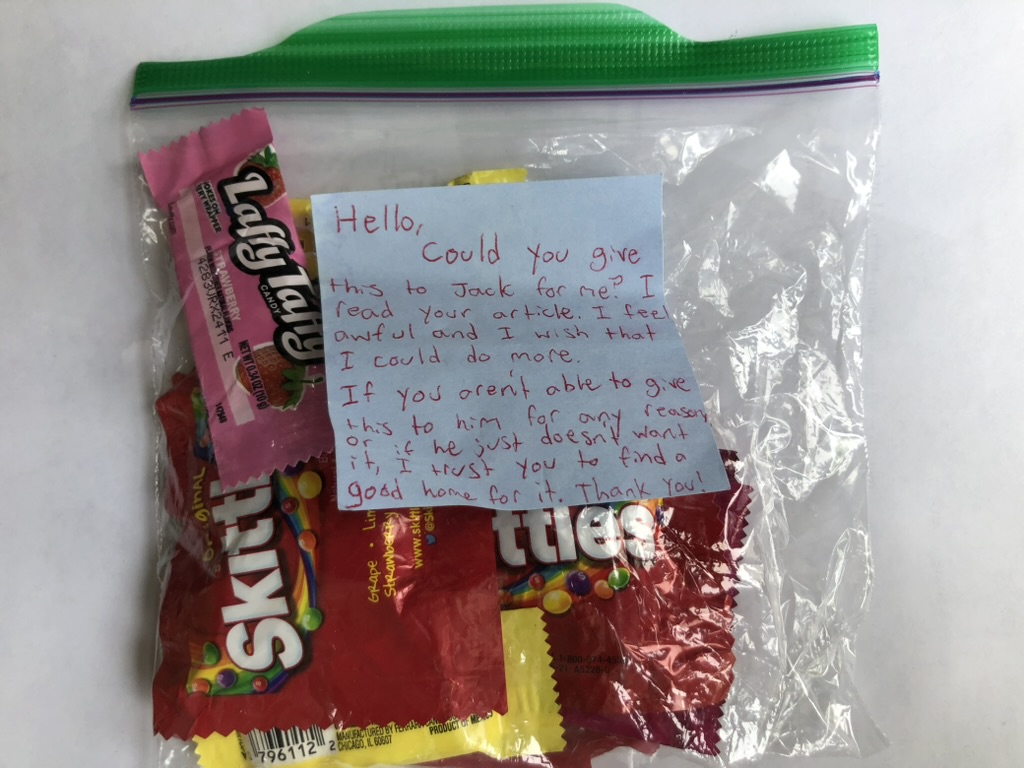In my campus mailbox last week I found a sandwich bag filled with “fun size” packs of Skittles and Laffy Taffy.
They weren’t for me, as an unsigned message, handwritten on a blue Post-it note, made clear:
Hello. Could you give this to Jack for me? I read your article and I feel awful, I wish that I could do more. If you aren’t able to give this to him for any reason or if he just doesn’t want it, I trust you to find a good home for it. Thank you!
Jack is the Penn State junior I wrote about last time who, like at least a couple of dozen other international students here, was ordered, for the flimsiest of reasons, to leave the country.
(Rep. Glenn Thompson, Trump’s man in Central Pennsylvania, defends ejecting students who have committed minor infractions on the grounds that we’re not treating them “any differently than what we have seen other countries do.” Makes you proud to be an American, doesn’t it?)
It occurred to me that Jack might have more pressing concerns than satisfying his sweet tooth, but I told him if he wanted the treats, I’d see that he got them. (Lucky for him, none of them were chocolates or I might have taken a finder’s fee. And if you’re worried that some MAGAlomaniac laced the candies with poison, shame on you! I had the same thought.)
A day or two later, Jack came by my office. I gave him the candies, he gave me the update on his situation. He’d connected with a lawyer in Pittsburgh who planned to file a class action suit on behalf of students at Penn State, Pitt and Carnegie-Mellon. (Another Penn State student has filed a separate lawsuit to stop the feds from deporting him.)
While waiting on the legal challenge, Jack was risking being abducted and sent who-knows-where. Though the email he got from Penn State Global had informed him he was “required to depart the U.S. immediately, as there is no grace period,” he was later given to understand that he had 15 days to “self-deport.” That graceless period had expired.
But then, in keeping with the Trump administration’s slapdash approach to wrecking the world, we learned that Immigration and Customs Enforcement (ICE) is giving international students a temporary reprieve while it hammers out a new review system.
Nice for someone like Jack, who hadn’t left yet; not so nice for Jill, the other student I wrote about previously, who had already fled.
My column about Jack and Jill yielded more than Jack’s goody bag. I also heard about a student who had packed up and left within 24 hours of receiving her eviction notice, and I got an earful from a faculty member who is incensed that the university isn’t doing more to support our international students.
This faculty member told me that one of his Ph.D. students was “living in fear and hiding.” Losing her assistantship meant losing her salary. And as soon as she lost her student status, University Health Service billed her $88 to stay insured. We Are!
Her department scrounged money to support her from an emergency fund, which is lovely, but shouldn’t be necessary.
News of deportations, this faculty member told me, “ripped through our grad program. Classes turned into therapy sessions. Learning is the core mission of all universities, and that mission is being compromised.”
As for ICE’s reversal: “This is good news…for now. But gosh, how many person-hours and dollars were wasted on this? Must be in the millions.”
So why is this happening? One theory I’ve heard recalls the famous line from anti-tax crusader Grover Norquist about wanting to shrink government until it’s small enough to drown in the bathtub.
Trump’s assaults on America’s universities suggests he wants them to circle the same drain. Already we’re hearing that students who had considered studying in the U.S. are making other plans. Why go where you’re not welcome? Why risk having your studies interrupted at the whim of officials who are trying to meet a deportation quota?
At public universities like Penn State, international students pay a lot more than the in-staters do. Trump knows we need those dollars. What he doesn’t know is that we – Penn State, State College, America as a whole — also benefit from international students’ contributions to the culture.
There are those who wax nostalgic about the State College they knew before the high-rises and national chains sprang up downtown and the big box stores proliferated on Atherton Street. I get that. But in the 30 years I’ve lived here, the town has become vastly more interesting as it has become vastly more diverse.
We are, as my dad used to say, cutting off our nose to spite our face.



